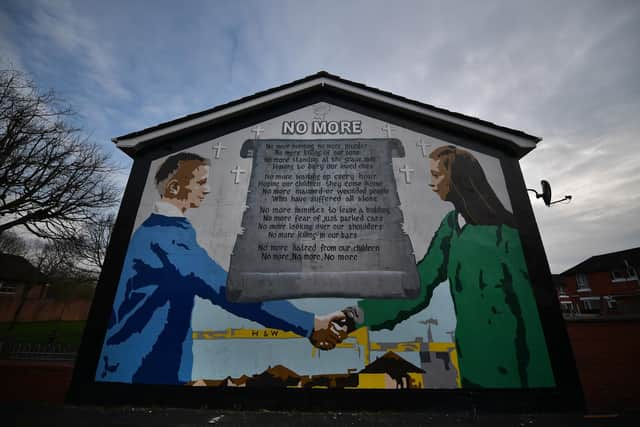Is pro-Union politics able to make Northern Ireland more inclusive?
and live on Freeview channel 276
In presenting the need for unionist politicians to engage more decisively and collaboratively with areas where poverty, underinvestment, educational underachievement and social deprivation blight communities the paper calls for an ‘infrastructure of support’ that works at a number of levels with those in need.
As areas that experience higher rates of poverty and below average incomes for NI, Derry and Strabane (along with areas in Belfast) should be at the forefront of efforts to address the damaging impact of deprivation and isolation.
Advertisement
Hide AdAdvertisement
Hide AdIn conversations with a wide range of people the NIDG conclude that unionist indifference and lack of concern for those who need help points towards a serious political and social deficit that reinforces underlying problems of anxiety, fear and depression.


It also undermines perceptions about the benefits of peace and the possibilities of change.
The need for unionism to advocate a strong inclusive ethos that is reflected in progressive policy development and closer working relations with those from poorer parts of NI that is proposed in the paper should not be seen as mere aspiration, but as a political and social imperative.
A deeper reading of the document will also indicate a much needed bottom-up, top-down convergence of political activity is being suggested that stresses a better NI is made more likely when there is a collective commitment and will to bring it about.


Advertisement
Hide AdAdvertisement
Hide AdAlthough we must recognise and praise the many groups across NI striving to alleviate or neutralise the impact of poverty and disadvantage we should be less enthusiastic about the party political apathy that exists when it comes to dealing with the urgency of such problems.
The NIDG has sought to avoid the quagmire of data often used to prove or disprove particular positions by seeking to encourage a new debate about social responsibility and the development of much-needed change.
Yet, the fractured nature of unionism further inhibits a consensus about how to proceed. The emphasis on resistance and defence does little to instil confidence or help advance a solution to problems.
In turn, there is no comprehensive sense of how emerging expectations and circumstances should be addressed or how the future might be envisioned and shaped.
Advertisement
Hide AdAdvertisement
Hide AdInterestingly, a number from unionist and loyalist communities admitted seeking help from Sinn Féin offices for social problems in the absence of interest and help from their own political representatives.
Most would praise the work of one or two individuals from the parties that they voted for but overall the picture of unionist politics is one of disinterest and lacking any enthusiasm for enabling those from poorer backgrounds to be involved building a more inclusive and optimistic society.
This is one of the reasons why the NIDG propose that ‘contact groups’ from within poorer areas should feed directly into the development and implementation of new initiatives and strategic planning at a party political level.
Unless political accountability and engagement with all disadvantaged communities is improved it is unlikely the message of a better NI will gain traction and the appeal of a new common good take hold.
Advertisement
Hide AdAdvertisement
Hide AdLoyalists being mainly of working class areas believe unionist political indifference to their circumstances comes from a class bias where they are looked down upon or seen as supportive of paramilitary activity.
In some cases this may be so since, as the Independent Reporting Commission has noted, an inclination to join paramilitary groups cannot be disassociated from ‘the underlying systemic socio-economic deprivation prevailing in communities in which paramilitaries operate’.
Yet this should not be separated, as the IRC also observe, from the political inability to ‘tackle what are exceptionally deep-rooted, intractable issues’ in ‘a sufficiently targeted way which takes account of the very particular circumstances prevailing in each of them’.
From this perspective the continuation of paramilitarism does rely on social deprivation but a lack of political will to deal with this connection enables its durability.
Advertisement
Hide AdAdvertisement
Hide AdParamilitarism benefits from the social deficit of poverty by providing a sense of meaning and purpose that resonates strongly in the absence of clear economic and social improvements that people feel motivated to protect and own.
Without the confidence of believing in a better future the past inevitably dominates expectations.
However an inclusive society is conceived such a society depends on respect, dialogue and collaboration.
For too long there have been unionist politicians whose message has not altered: to prevent them vote for us.
Advertisement
Hide AdAdvertisement
Hide AdThere has been no sense of progression, positivity or change. The effects of poverty and isolation in Derry/Strabane are not republican problems just as in Coleraine or Portadown they are not unionist problems.
They are social problems for NI as a whole that require attention and a collective commitment to overcome.
The paper has been released to encourage debate about what a new inclusive politics that cuts across class might look like and suggests working more deliberately and strategically to reinforce the perception that all are integral to progress and building confidence.
Unless unionist politicians wake up to the urgent need for a more inclusive society it is likely that they will become increasingly powerless to influence change, in the process becoming less and less effective not just within the communities they pertain to represent, but for NI itself.
There is now a real and urgent need for unionism to recognise this failure whatever the polls tell us. Numbers encourage us to read situations in numerical terms but individuals, communities and societies look to values and stories to make sense of the world in which they live.
Advertisement
Hide AdAdvertisement
Hide AdIt is time for unionism to start talking about what values and stories are needed to make NI a better place and demonstrate the benefits of both through a new inclusive politics of collaboration and respect.
The new paper can be accessed at www.nidg.co.uk